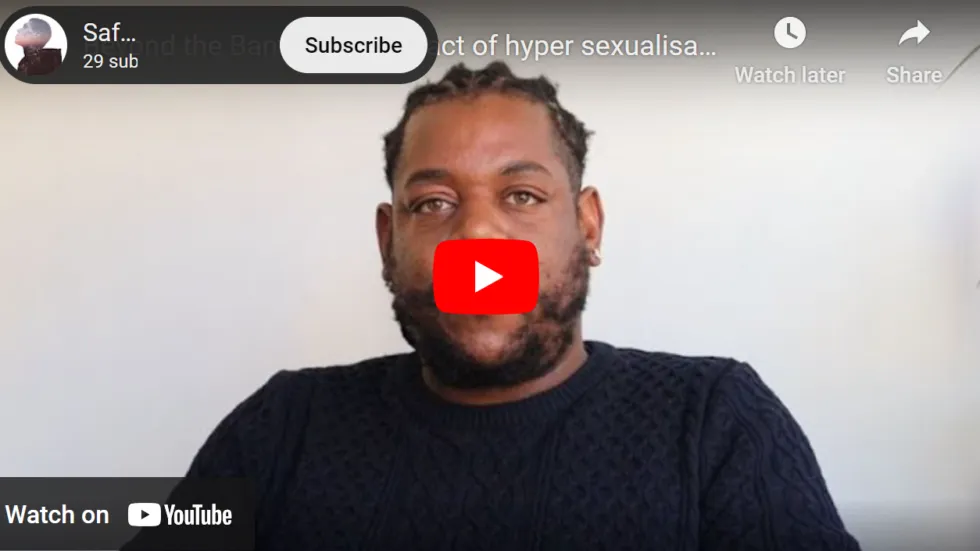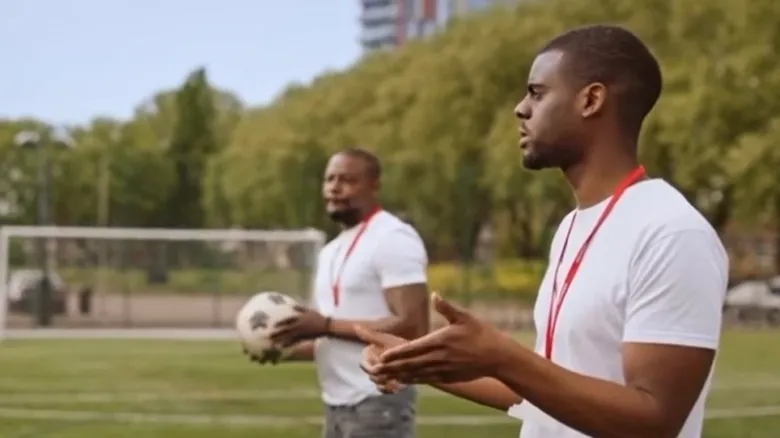
Beyond the Banter: breaking down barriers with a peer led approach
We know through our work with young Londoners, that there are many barriers children and young people face when it comes to emotional wellbeing and accessing services and support.
However, these difficulties are often exacerbated for young boys and men from Black communities. Whether this be from the stigma attached to their intersecting identities as being male and Black, trying to access services which have been developed with a European cultural lens, or moving through systems which are entrenched in structural racism.
Black boys and young men in London face multiple challenges that can impact on their mental wellbeing. Lack of affordable housing, challenges within the education system and limited opportunities can all build up like a pressure behind a dam. This, combined with racial trauma and living within a system of structural and systemic inequalities, can cause that dam to burst.
Safer London Peer Educator
We’re always being expected to commit crime. Are we that bad? Being pre-judged makes you feel depressed. It’s work to convince people I’m not a threat.
During the Covid 19 pandemic, those multiple risk factors were further intensified. So we knew coming out of the pandemic was the right time to act and invest in a peer led project, with the aim to empower young Londoners to support young Londoners.
Watch the video where Beyond the Banter Training Facilitator Aaron, discusses the barriers young Black men and boys face, as well the impact that hyper sexualisation and criminalisation of young Black boys and men has on emotional wellbeing.

Taking a peer led approach – the Safer London Peer Educators
That’s where Beyond the Banter comes in. Over six months we recruited a group of young Black men from across London, all with their own life experiences. We invested time and resources to upskill and empower them to become Peer Educators. Our goal – to get the Peer Educators out into the community to simply get young Black boys talking about mental wellbeing. By listening to the experiences of those they could relate to, we hoped to dismantle the barriers, whilst at the same time encourage seek helping behaviours.
Using a combination of virtual delivery and professional training, the team of Peer Educators were upskilled in four main areas: starting conversations, sharing stories, creating safe spaces, and closing conversations. With their learnings, they worked with the Safer London project team to co-produce a model of workshops, aimed to start discussions around mental wellbeing. This coproduction ensured that the workshops were culturally competent and contained messaging and tone that would allow our target audience to connect with the material.
Throughout the programme of training, the Peer Educators were challenged to address their own bias and relationships with emotional wellbeing. We gave them an opportunity to safely explore their own emotional wellbeing journey, but also to support each other as a trusted and positive group. The project allowed them to gain insight into the concept of racialised trauma and how that impacts behaviour. It was important for us that the Peer Educators were able to decompartmentalise their own experiences and own traumas, before going out into the community.
Safer London Peer Educator
I am very passionate about my role as a Peer Educator. With more knowledge and understanding, I believe we can make a big difference by impacting others with our stories.
Working in – and with – the community
To reach young Black men and boys, we partnered with four community organisations. We provided support for the groups to facilitate events, which in turn connected the Peer Educators with the boys and young men who used their spaces or services. By partnering with Crying Sons, Spark2Life, Code 7 and Hackney Wick FC, we were able to reach 286 young Black men and boys over a four-week period. 74% of those who attended the sessions said they would start having more conversations about emotional wellbeing with friends and family.
“Mental health is a discussion that has been much avoided especially by young Black males. So, the fact Safer London wanted to highlight this with our players at Hackney Wick FC was music to our ears. The peer led initiative allowed the young men to learn and be proactive in taking initiatives with their own mental state and not be afraid of the stigma. This is an initiative that should be taught across the UK which allows the mobility of the message to spread and encourage positive outcomes which can ultimately save lives.”
Bobby Kasanga, Founder Hackney Wick FC

Sharing what we learnt – to empower others
We learnt a lot on this journey, but we feel we’ve only just scratched the surface. One thing we know for certain, is that Safer London isn’t best positioned to deliver this type of community intervention. We strongly believe this should sit within communities – being delivered by the community, for the community.
As an organisation who focusses on the notion of generous leadership, we know we want to play a role in empowering communities. We also believe that this model could be applied to other cohorts, whether this be young Muslim men or young Black girls.
To help enable this, we developed Beyond the Banter: A Professional’s Guide. This free open-source guide takes you through our journey, step by step. Discussing how we adapted our recruitment to induction processes, to what training tools and techniques we used. By sharing our learning and experiences, we hope others can follow in our footsteps.
Our aspiration for the future is to further develop this work by partnering with community grassroots organisations across the UK, to support the roll out of the model in their local area.
Our aspiration for the future is to further develop this work by partnering with community grassroots organisations across the UK, to support the roll out of the model in their local area.
“Everything starts from actually just opening up and talking. This project is about getting young people to talk, getting them to move towards health seeking behaviours, and getting them engaged in thinking about how to improve their mental health. This peer model, we really do believe it works because it focuses on the language, the background and the environment that those young people come from. We’re really proud of it. We know it can’t work in every single situation. However, we do know that by using the overall framework that we’ve designed and by getting passionate, really motivated people to deliver and to engage with the process, that we can make changes and that we can improve the mental health, of not just young Black boys, but any group.”
Aaron Charles, Beyond the Banter Training Facilitator
The model and hard work of the Peer Educators, the Safer London Beyond the Banter project team, and the community organisation partners, was recognised with a win in the Early Intervention category at the 2022 CYP Now Awards.
Read the guide
CLICK HERE